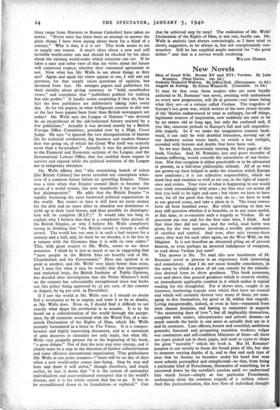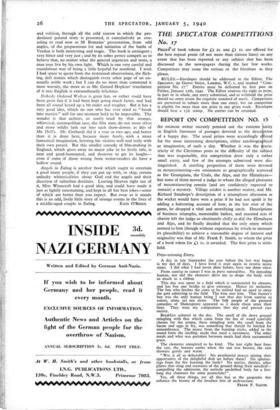New Novels
Men of Good Will. Books XV and XVI : Verdun. By Jules Romains. (Peter Davies. los. 6d.) IT may be that even those readers who are most loyally addicted to M. Romains' vast novel, awaiting with enthusiasm its every new progression, will jib at present—our times being what they are—at a volume called Verdun. The tragedies of Europe's last great war, which writers of the now closed decade of the 'thirties endeavoured to treat as unhappy, far-off things, legitimate sources of inspiration, now suddenly are seen to be by no means old or long ago, but only the confused and, if you like, innocent prelude to Europe's full and still unpredict- able tragedy. So if we make the imaginative journey back- ward, it can only be with doubled bitterness, moving out of our darkness across waste lands, to revisit a lost twilight, crowded with horrors and deaths that have been vain.
So we may think, uncertainly turning the first pages of this book, Verdun. And M. Romains, just and grave recorder of human suffering, would concede the naturalness of our hesita- tion. Not that escapism is either practicable or to be advocated at present, as a full-time philosophic attitude. All of us Who are grown-up have helped to make the situation which Europe now confronts ; it is our collective responsibility, which we must face and examine as well as we can, in the light of experi- ence and events. Your view of what is happening to our world may clash resoundingly with mine ; my bias may cut across all that you hold to be right and sane ; but views we have to have now, for all the good that they may do us ; we have to look at our general scene, and take a place in it. The ivory towers have all been bombed away. But while agreeing to that we may still question whether it is bearable, or in any sense useful, at this time, to re-examine such a tragedy as Verdun. Its ne passeront pas was said for the first time then, I think. And that time they did not pass, and the awful, mad battle was
given, for the two nations involved, a terrible pre-eminence of sacrifice and symbol. And now, after only twenty-three years, they wait for each other again, on the West Wall, on the Maginot. Is it not therefore an abnormal piling on of present distress, or even perhaps an inverted indulgence of escapism, to read about Verdun just now?
The answer is No. To read this new instalment of M. Romains' novel at present is an experience both interesting and consolatory. And I do not mean broadly consolatory, in the sense in which a piece of art can console by the stimula- tion derived from its sheer goodness. This book possesses, over and above that general goodness which is creative vitality, an immediately applicable comfort in it which makes it topical reading for the thoughtful. For it shows men, caught in an immense, lumbering tragedy over which they have no control
and which will certainly destroy very many of them, yet man- aging to live themselves, for good or ill, within that tragedy. Living exasperatedly, indeed, or even in fury—separated from their chosen destinies, and having to remember in anguish "the sauntering days of love "; but all implacably themselves, complete with names, idiosyncrasies and private dreams—as much outside the battle in one sense as actually they are in it and its creatures. Line officers, honest and resentful; ambitious generals; harassed and prospering munition workers; vulgar war contractors and self-confident Ministers of State—all these are types picked out in these pages, and used as types to shape the great " morality " which the book is. But M. Romains' purpose is not merely to focus the broad plain of life, but also to measure varying depths of it, and to that end each type of man that he fastens on becomes under his hand that man most soberly personified and complicated—so that, from being a particular kind of Frenchman, illustrative of something, he is narrowed down by the novelist's passion until we understand him •much better—simply as one particular Frenchman, undergoing alone the common tragedy of a million others. And this particularisation, this free flow of individual thought
and volition, through all the cold sorrow in which the pre- destined general story is presented, is cumulatively as con- soling to read now as M. Romains' presentation, from odd angles, of the preparations for and initiation of the battle of Verdun is both interesting and tragic. The book is astringent ; very bitter and very just ; and by its sober power compels us to believe that, no matter what the general urgencies and woes, a man may live by his own light. Which is one very careful and roundabout way of being a little hopeful for mankind. I wish I had space to quote from the restrained observations, the flick- ing, deft ironies which distinguish every other page of an un- usually noble work ; but I can do no more than commend it most warmly, the more so as Mr. Gerard Hopkins' translation of it into English is extraordinarily felicitous.
Nobody Ordered Wolves is great fun, or rather could have been great fun if it had been kept going much faster, and had been all round keyed up a bit ruder and tougher. But it has a very good idea, which no one who has ever tried to " break into movies " will for one moment hold to be impossible. The wonder is that authors, so sorely tried by that strange, whimsical, cosmopolitan race, the film men, do not more often and more wildly lash out into such show-downs as this of Mr. Dell's. Mr. Gerhardi did it a year or two ago, and better than it is done here, because more freely, with a more fantastical imagination, hoisting his victims well and truly with their own petard. But this smaller comedy of film-making in England, which gives away its major joke in its lively title, is neat and good-humoured, and deserves to get its laughs— even if some of those wrung from writer-readers do have a hollow sound.
Angels in Ealing is another book which ought to entertain a good many people, if they can put up with, or skip, certain unlucky whimsicalities about God and the angels and their direction of suburban destinies. Leaving Heaven right out of it, Miss Winncroft had a good idea, and could have made it just as lightly entertaining, and kept in all her best jokes—some of which are better than you expect. But even as it stands this is an odd, lively little story of strange events in the lives of a middle-aged couple in Ealing. KATE O'BRIEN.



































 Previous page
Previous page